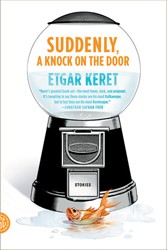Given their range and quantity, the thirty-plus stories compiled in Etgar Keret’s new collection, Autocorrect, constitute what feels like a journey through not only the author’s mind but also his soul.
Keret’s fiction is doled out in swift, propulsive blasts — some more rattling than others. In Autocorrect, we blast through parallel universes, cynical cosmic game shows, simulations, and the afterlife.
In addition, a number of striking stories take place on earth as we know it. “A Dog for a Dog” sets three Jewish Israeli boys on a mission of vengeance against an Arab man who accidentally killed their pet. In just a few pages, using the template of headstrong, foolish children, Keret indicts biblical wisdom and its modern antecedents. When one of the boys confesses he doesn’t want to hurt the man’s dog, another boy says, “‘I don’t either. Believe me, I don’t. But if we don’t do it, if we don’t teach them a lesson, once and for all, it’ll never end.’” The confounding nature of violence also figures into “Cherry Garcia Memories with M&M’s on Top,” in which a shell-shocked combat veteran contends with his mother’s dementia. “‘I killed someone,’” the character states. “‘That’s not trauma. That’s what soldiers are supposed to do. I even got a medal of honor.’” Even Keret’s sci-fi doesn’t veer far from the world in which we’re living; they just happen to involve aliens or time travel. One gets the sense that life has caught up with Keret’s vision — that ideas that once seemed startling (digital companionship, for example) are now ordinary.
Throughout the collection, Keret is as deftly — and darkly — comic, as readers familiar with his decades’ worth of writing will have come to expect. In “Mitzvah,” a promising boys-day-out on drugs at the beach turns into tripping at the temple when one character is recruited into a minyan. Beyond their often absurd premises, Keret’s narratives can digress with hilarious results. In “Gondola,” for example, a character comes across a man named Oshik and observes that, “The only other Oshik she’d ever known was her dad’s uncle, an insurance broker from Netanya, and he was eaten by a shark.” Comedy provides a release valve for the pressures of his characters, who are facing alienation, insecurity, and decline.
“Living is the easiest thing in the world,” Keret writes. “Surviving … that’s another story.” Our lives all follow the same basic arc: we are born, we live our lives as mortals, and, finally, we die. No surprises there. Yet the simplicity of this sequence, Keret seems to be saying, belies the bewildering, mysterious, deeply individual experience of being alive. How to reconcile it all? How to reconcile with an impossible reconciliation? Autocorrect feels like part of the process.
Megan Peck Shub is an Emmy-winning producer at Last Week Tonight, the HBO political satire series. Previously she produced Finding Your Roots on PBS. Her work has been published in New York Magazine, The Missouri Review, Salamander, and Vol. 1 Brooklyn, among other publications.





